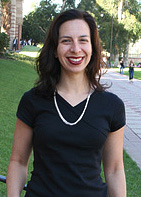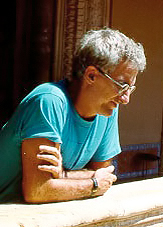
Marissa Lopez
Assistant professor of English

Chris Tilly
Professor of Urban Planning and director of the Institute for Research on Labor and Employment
By Teofilo Ruiz
It is unnecessary to defend the value of a liberal arts education. That the humanities and social sciences are important is an undisputable fact.
Critical thinking, engaged citizenship, a historical perspective on the world and even on scientific knowledge requires an understanding of the past, of the structures that govern the world, of literature, art and the manner in which humans relate to each other and to the world around them.
The reality is that, whether engaged in technological fields or not, we all should be aware of the humanistic values that underpin our ability to assess critically the world in which we live.
At the same time, humanists and social scientists should also be as familiar with scientific methods and scientific discourse as possible in our complex disciplinary areas. That is the purpose of our general education requirements: to produce full and well-informed citizens in different fields of knowledge.
But in attempting to answer your question, it seems to me that it has been posed incorrectly. Education is not, should not be, about “value.”
Education is a life-long voyage of discovery, a discovery of the self, of others and of the world in which we live. It is a discovery of our past, of the cultural “webs of significance” in which we exist. Choosing a career should not be about “value” or the commodification of knowledge.
Choosing a career, whether in the technological fields or in the liberal arts, should be, first and foremost, about fulfilment, about vocation. If, as Aristotle argued, all men (and women) by nature desire to be happy, then we must choose callings that make us happy, areas of knowledge that we can embrace with passion, that are meaningful to our lives.
Most of you will work for the next 50 years of your life. Forget value! Think instead of your own values! Choose to do something you really like. Choose to be happy.
Choose to give meaning to your life. To choose a career because it has “value” (by which is meant income and prestige), but that will make you miserable for the next 50 years, is just not worthwhile.
Pursue knowledge that fulfills you, but try to learn about other things as much as you can. Then you will be a far happier human being, and you may also make a real contribution to the world and to others.
By Chris Tilly
The most important thing that we learn in college is how to learn. There are many dimensions to this: how to approach an unfamiliar problem, how to read critically and selectively, how to frame good questions, how to look for the underlying logic of a complex system.
These skills are, if anything, more important than they were when I graduated from college 35 years ago. The world is changing more rapidly now because of exploding globalization and accelerating technological change.
In today’s world of work, people change careers more often, and even those who stay in the same career need to shift gears frequently. This is a world that places a premium on the ability to learn!
And studying the humanities or social sciences teaches us to learn.
These degrees probably do more in this regard than an engineering or accounting degree does, because humanities and social science curricula typically cover a broader range of topics. It’s not accidental that the top consulting firms hire many more history students than management students.
What’s more, globalization itself ““ mass immigration, the growing reach of transnational businesses and urgent problems of global scope such as climate change ““ makes it increasingly important to understand other societies and cultures.
Speaking a second (or third) language, understanding world history and being familiar with other political systems are big advantages in many jobs, and that advantage is only going to grow.
Of course it’s important to pick up some practical skills in college as well. But most important is finding a subject that excites you so that you learn to love learning. Whether you study medieval history or nanotechnology, it’s the ability to learn that will serve you best in years to come.
By Marissa Lopez
What is the value of a humanities degree like literature? This question assumes a few things: that education is about content delivery more than critical thinking; that it is a service provided to the student, leading to a clear goal; and, finally, that there is a meaningful distinction between the technological and the humanitarian.
We’ve all heard the saying, “Give a person a fish and they’ll eat for a day; teach a person to fish and they’ll eat for life.”
Consider this: challenge a person to think about how we fish, why we eat fish, what role fish plays in our and other cultures, what other cultures eat, and that person will not just fish, they will create and revolutionize an entire industry.
Those questions, that training, those outcomes are what a humanities degree offers.
We learn to “read” the world when we learn to critically read texts in our humanities classes. We learn to evaluate and analyze information and how to understand multiple positions besides our own.
By exploring different times, different places and different people, we learn to truly understand those differences and our own biases toward them.
When we learn to be responsible readers and writers we learn to be responsible citizens of the world; we learn to be free and independent thinkers who can listen to, and understand, others.
Literature, for example, represents the world, but it also teaches one to move beyond representation, to dive into the page and ask what and how language represents and why we believe the things we believe.
Pursuing any humanities degree helps us to understand and analyze the world, not just to live in it but to make it better. The humanities teach us to see the world differently, to be visionary problem solvers in a problematic world.
